
There are so many choices to make when we start to homeschool. And the question: What homeschool curriculum best fits our style and needs? is at the top. After over a decade of homeschooling, here is what we’ve found works for us. Take, mix with brains, and experiment with curiosity to find out what works best for your family.
As a second-generation homeschooler, here are ALL the best homeschool curriculum and books we’ve chosen over the last 12+ years (and some mistakes too).
My husband and I both grew up homeschooled and now are homeschooling our five children.
(Edited to add: When I wrote this, we had 5 kids at home from 16 to 6 and all of them were being homeschooled. Now, in 2024, we have a homeschool-graduate son who is married and a successful Real Estate agent, a homeschool-graduate son thriving as a piano teacher and a junior at New St. Andrews College, and 3 remaining homeschooled students. Our homeschool was not usually Instagram-able, but it was a blessing for us all that we don’t regret. My adult sons say they also plan to homeschool.)
We homeschool classically; that is, we believe education is a training in Truth, Goodness, and Beauty. Education encompasses all of life and not only the work on a checklist or what we do from breakfast-lunch in the mornings. More than studying Latin and literature (which we do), classical education is about pursuing it all in order to grow in virtue.
Christian classical homeschool education is our style because we believe truth and wisdom need to be the guiding principles as well as the aim we strive for.
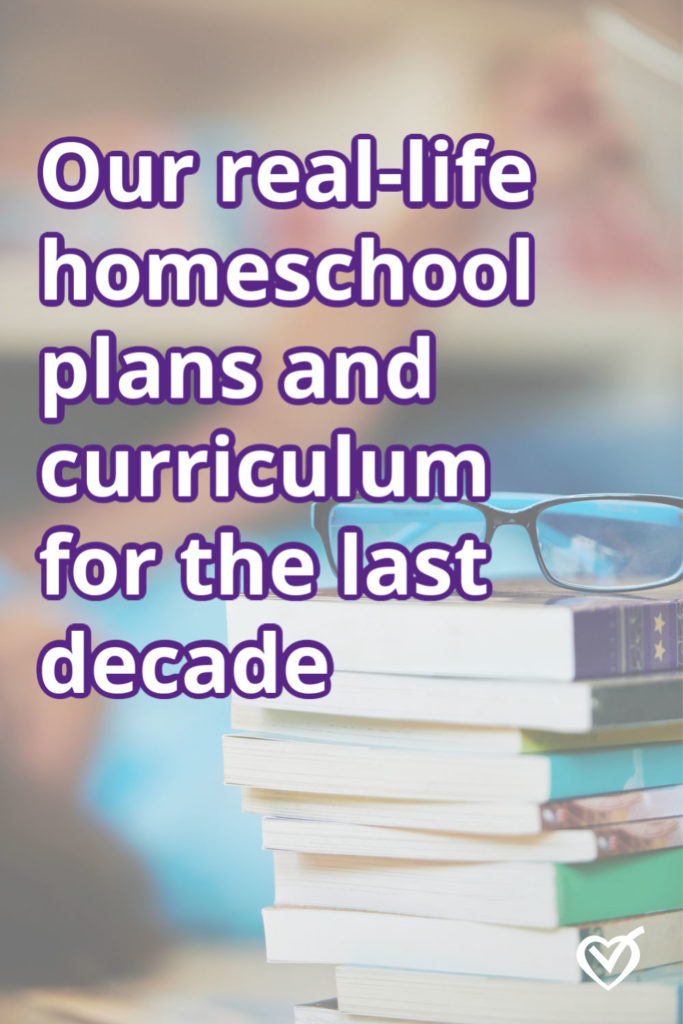
Table of Contents
- Our homeschool story
- How I make our homeschool plans
- Our Real-Life Curriculum Choices
- Homeschool Planning Help
- Working the Homeschool Plans
- Planning Our Homeschool Morning Time
- Homeschool Curriculum Specifics by Grade
Our homeschool story
My husband and I were both homeschooled, and now it’s our turn to homeschool our crew. Neither my husband or I have ever gone to public school (at least, not until community college and university). That puts us at a huge advantage for weaving education into life, because our parents did the hard work of de-schooling their approach. I don’t remember what class it was for or why I picked the topic, but in college I ended up writing a research paper on classical education in a homeschool setting.
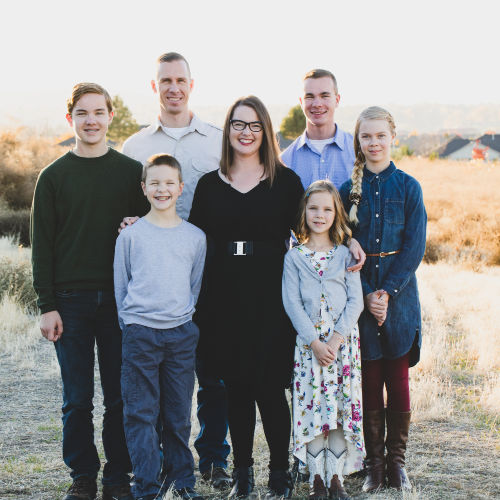
I interviewed a teacher at Logos School who homeschooled his own children, and that conversation made me realize I had no idea what I was stepping into. I wrote the paper, but it only left me feeling completely ignorant about the topic. That was not acceptable, so from then on, before my husband and I were even married, I was a classical education research hobbyist.
I found Cindy Rollins when my oldest was a toddler and read Norms and Nobility, Leisure: the Basis of Culture, and Poetic Knowledge with her online book clubs before we ever started “real school” (in my mind, that’s third grade).
Finding myself with actual small children of my own, I repented of my early-twenties’ arrogance that my mom’s “better late than early” Moore-inspired approach was lacking and lazy.
A year or two into Classical Morning Time and Math-U-See and read-alouds, we repented of our early-twenties’ attempt to launch an ACCS classical school. I was not going to give up this amazing life of learning alongside my children, exhausting and demanding as it was.
We have five kids, a boy aged 16, a boy aged 14, a girl aged 11, a boy aged 9, and a girl aged 6. I’m in my thirties and we’ve been homeschooling for over ten years. After investing my idealistic twenties into educational philosophy and reading dozens of amazing education books, now I find it’s time to stop (only) thinking and writing about it and actually flesh it out in real life.
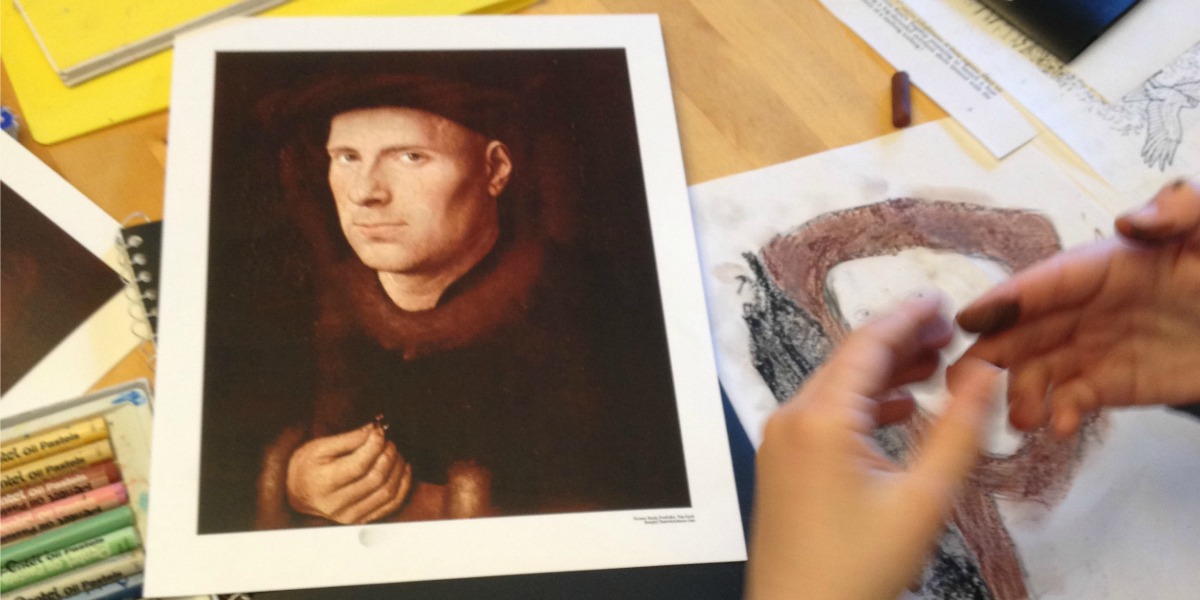
So, what does it look like to actually put these principles we’ve been talking about into practice? What do these principles look like with real people in a real home?
It looks different in every family, but here’s what it has looked like in ours, from year to year, homeschooling preschool through high school.
How I Plan a Classical Homeschool Education
It can be intimidating to make a homeschool plan. It feels like a place for an expert. And it is. But the expert that is needed is not a curriculum guru, but an expert in the particular students being taught – and that means mom.
Gather a few trusted sources: Moms who have blazed the trail, moms just a year or two ahead but in the thick of it still, book lists, multiple curriculum guides (as examples), and more book lists. This is how I begin each year, also.
Most importantly, we need a curriculum filter. There is so much out there, so many good options. We can’t do them all, and we shouldn’t feel bad that we can’t. Start with your family’s own priorities and standards, not a curriculum provider’s standards and expectations.
Years ago, there was a homeschool trend to set a Rule of Six – or five, or seven. This was a way to remind ourselves of what was most important in our homeschool days, especially because the priorities are usually not what show up on a publisher’s scope and sequence.
For me, keeping track of six facets of life daily helped me, especially in the early crazy days with everyone under ten, to remember that education isn’t about how many math sheets or spelling words one does, but about becoming a well-rounded, developed person.
Here are the six daily “rungs” of our day I chose:
- Worship — pray, read Scripture, obey God
- Work — chores, school, keeping possessions in order, helping
- Read & Listen — learning and language development
- Think — narrate, discuss, contemplate, problem-solve, write
- Move — outdoor time all days possible
- Overcome — gain self-control & self-government with attitudes and work ethic
I settled on that last one because I wanted to remind myself that a bad attitude or a mess made or a habit forgotten is not necessarily evidence of failure, but is always an opportunity to grow. I needed a perspective shift. I wanted to see my main role as a teacher as the one helping my students learn how to learn themselves, and it’ll be rough going — tripping and stumbling and falling is inevitable. Keeping them lifted up and on a steady path is my primary job, not pouring information into their heads.
These six categories are just as applicable to myself as to the children, and they will hopefully find them just as useful when they are adults. If these six aspects of life become habits, become ingrained parts of everyday life, they will continue to serve them — and me — well.
After a few years of homeschool practice and reading and iterating, I also developed a shorthand version of our family’s educational principles and priorities.
Every homeschool needs education philosophy
As mother-educators, whether we like it or not, we have a philosophy of education that shapes our decisions in planning and in day-to-day decision-making. It behooves us, therefore, to develop that philosophy, to grow in understanding, and to draw closer to truth each year.
- 3 components of a classical education that won’t show up on a transcript
- Why are classical education principles important?
- Imitation as learning style
- Put the classical back into classical education (on short lessons & memory work)
Many people try to skip philosophy and jump straight to curriculum. However, classical education is a philosophy. So the curriculum you use, whether it claims to be classical or not, cannot be classical if your own approach and mindset is first classical.
Classical education starts with you, the mother-teacher and administrator, not with the curriculum.
My Classical Homeschool Vision Statement
Our homeschool pursues a Christian, classical, holistic education.
Christian
[kris-chuhn]
- of, pertaining to, or derived from Jesus Christ or His teachings
- exhibiting a spirit proper to a follower of Jesus Christ; Christlike
In our homeschool, this means
- All of life is under the Lordship of Christ.
- Our identity is in Christ alone.
- God’s redemptive, historical, eschatological story is the story we want to tell, to live, and to own.
Classical
[klas-i-kuhl]
- (of an education) based on the humanities and the study of Latin and Greek
- (of the arts) denoting or relating to a style in any of the arts characterized by emotional restraint and conservatism
In our homeschool, this means
- We educate in the stream of our heritage: Western Civilization.
- We study the trivium & quadrivium (including Latin) as our base, and we dismiss modern subjects like social studies and health.
- Our aim is virtue, not a white-collar job.
Holistic
[hoh-lis-tik]
- Philosophy. the theory that whole entities, as fundamental components of reality, have an existence other than as the mere sum of their parts.
- care of the entire patient in all aspects of well-being, including physical, psychological, and social.
Synonyms: integrated, complete, whole
In our homeschool, this means
- Our educative efforts aren’t confined to formal studies, but bleed out into all of life.
- Every bit of life and home and family makes up the education of a whole man.
- Children are bodies, souls, and minds, and we treat them as whole people; we don’t compartmentalize their being and we don’t compartmentalize our days and we don’t compartmentalize our life or faith or learning.
Education
[ej-oo-key-shuhn]
- the act or process of imparting or acquiring general knowledge, developing the powers of reasoning and judgment, and generally of preparing oneself or others intellectually for mature life.
- An instructive or enlightening experience.
Synonyms: enculturation, nurture, upbringing
In our homeschool, this means
- Education is about forming a whole student toward virtue rather than preparing him for a job.
- Education is primarily focused on thinking and ideas and abilities rather than specific content or facts.
- “Education comprehends all that series of instruction and discipline which is intended to enlighten the understanding, correct the temper, and dorm the manners and habits of youth, and fit them for usefulness in their future stations.” –Noah Webster

HOMESCHOOL AUDIT
Make next year better based on how this year went.
Download the free homeschool audit and use this year’s experience to make next year better.
How to Classically Educate at Home
What is classical education and can it be done at home? Can it be mixed with or influenced by other methods? Is classical education a method at all?
When we look to random internet sources, we end up more confused. That’s why we need to go back to original sources and let the classical and the medieval educators tell us what these terms mean.
After all, a label is a tricky thing.
One homeschool label is “classical.” Under that umbrella, you can find many different – sometimes seeming contradictory – definitions and applications.
But, if we look at principles rather than methods, then I think we will find many of those different voices agreeing more than not.
What was meant by education has remained principally the same until the Industrialization. Education has meant a pursuit of Truth and understanding, the pursuit of wisdom.
An educated person was one who is conversant with ideas and history and knows how to comport himself properly in light of this.
Virtue, loving wisdom, is the heart and guiding principle of classical education.
Christian classical education is a mindset
Classical education, rather than a specific set of instructions or books, is a spirit, a concern, a conscience. It is a mindset more than it is a method. Sure, there are methods – there must be for anyone to do anything – but it is the mode, the mind, the mood that matters more.
That mood, that mode, is one of curiosity. That curiosity is not idle, but active – pursuing not satiety or selfish ambition, but truth. This bent of the mind [curiosity] allows the educated man to go on educating himself or extending the realms of knowledge for his fellows.
Classical education requires wonder, in both the sense of marveling and questioning. It marvels because it realizes it doesn’t know. It questions so as to know more and attain to as much truth as possible, knowing all of life is not long enough to discover all the truth out there to be known.
Get curious and wonder with me:
- Classical education distinctives
- Defining education – timeless quotes
- A brief educational theory history: Why call it classical education?
- What does classical education mean? and why does it matter?
- What’s the difference between school and education?
Have you ever wondered how classical and Christian can go together when the original classical thinkers were pagan? Let the church fathers tell you how:
- Why classical? Why pagan philosophy? – a church father replies
Our Classical Homeschool Curriculum Choices
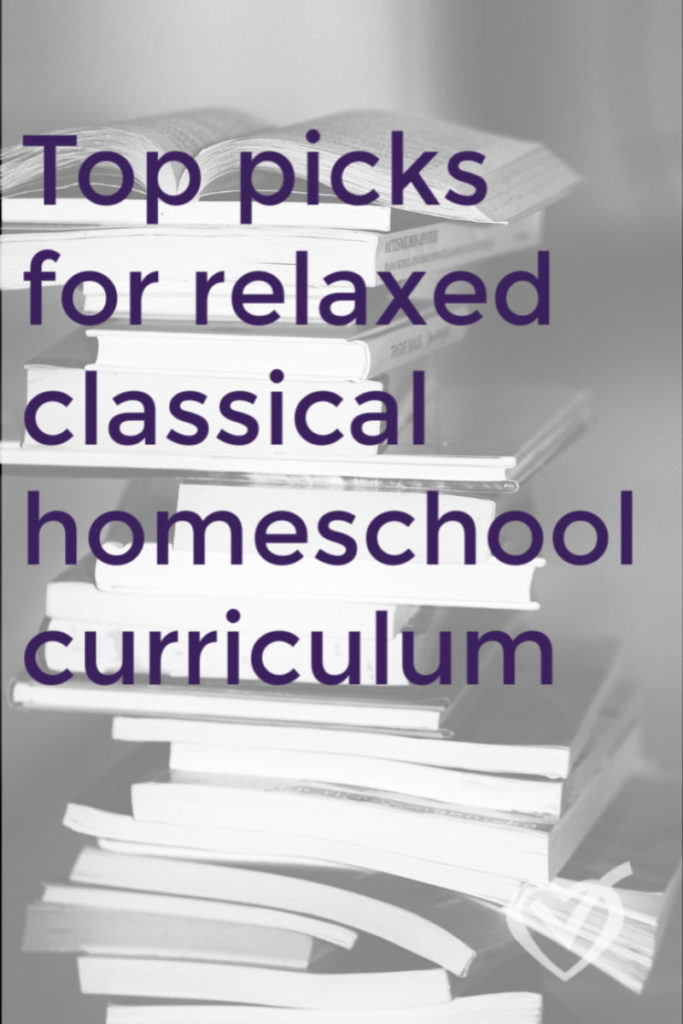
What the best homeschool classical education curriculum picks have been for us does not necessarily mean these will be the best choices for you.
When I start planning for our next school year – any part of it – I start off with a “brain dump” of sorts and construct the ideal morning that includes everything that sounds lovely and engaging.
Then I start crossing things off. “Will this actually happen in our house?” No. “Is this really worth the preparation and enthusiasm effort it would require of me daily?” No, if I put my energy there, realistically it is only taking it from Latin – and it’s not something worth trumping Latin.
So I start with the therapeutic list and then whittle it down to the realistic list, knowing that implementation will eventually whittle it down further still.
That’s the way a real homeschool year rolls, and now I expect it.
Homeschool Planning Help
I could try to go into a big, long article on how to go from blank paper to a completed school plan that’s ready to go, but I’m not going to because my friend Pam already has done so, more thoroughly and more helpfully than a blog post ever would be.
And if you’re discouraged by your own planning efforts so far, check out this great article she wrote: Four Keys to a Homeschool Plan That Actually Works
The four keys she outlines are pretty much the entirety of any homeschool planning secrets I might have – so I guess they weren’t really secrets. :)
Seriously. Plan Your Year is awesome because Pam is the best at step-by-step instructions and keeping concepts approachable. If you need some help pulling together a complete and thoughtful school plan, there is nothing better out there than Plan Your Year.
Planning Our Homeschool Morning Time
Morning Time (also known as “morning basket”) is the most important part of our day, but it is not really a subject. It is a practice.
Morning Time is an integral part of language development in our house, but in addition, we heavily emphasize correct usage, clear communication, and wide reading. All these are a way of life, not limited to school subjects or school hours.
During Morning Time we also read and memorize Scripture devotionally and prayerfully, but I believe there is also value in catechizing our children and discussing theology with them. They ought to know their Bibles so they are not swayed by every wind of doctrine.
Check out our Classical Morning Time Plans here.

HOMESCHOOL AUDIT
Make next year better based on how this year went.
Download the free homeschool audit and use this year’s experience to make next year better.
Homeschool Curriculum Specifics by Grade
Although the idea of classical homeschooling can be intimidating and appear unreachable, it is far more down-to-earth than we might think. This task is not too lofty for us, homeschooling moms with households to run; in fact, our very lifestyles are an asset, not a hindrance.
Modern education tends to be utilitarian; that is, concerned with usefulness, with economic advantage, with production. Classical education has always been aimed at forming a certain type of person: a free man.
Now, classical methods can be employed for utilitarian ends, and they often are. When we take classical methods and use them in order to get good test scores, in hopes that our children will get good jobs, or in order to get into a prestigious college, then we are actually pursuing the ends of modern – not classical – education.
Classical Homeschool Education for the Early Years
What preschool and kindergarten looks like for the oldest versus subsequent siblings is definitely different, because with younger siblings, learning and reading and all that is happening around them and they soak up a lot.
It might take you a few tries to find a good fit – don’t feel like you have to have all the details and schedule ironed out perfectly before you begin. Pull a few things together, give it a shot, and it’s learning by doing from then on as to what will work for you.
Click here for my Classical Kindergarten Homeschool Curriculum picks.
Classical Homeschool Education for Elementary Grades
The goal of the elementary years (roughly 7-11yo) is to fling wide the doors of interest and cultivate the habit of attention. In addition to skill-based work like math and handwriting, we read lots of good books on a wide array of topics. You might peg some as history, science, geography, or literature, but the point is that the exposure is consistent, cheerful, and broad.
Click here for my Classical Elementary Homeschool Curriculum picks.
Classical Homeschool Education for Middle School
The middle school years are transition years, and that makes them rocky at times. As mothers we want independence to look like easier days for us, and it turns out easier is what they want independence to mean, too. Expectations will collide. Hang on, hold the line, hold on to your child, and weather the storms of puberty. Be impervious.
Click here for my Classical Middle School Homeschool Curriculum.
Classical Homeschool Education for Homeschooling High School
Yes! It is possible to homeschool high school. You do not need to spend hours in documentation, either. Homeschooling high school is actually my favorite.
Click here for my Classical High School Homeschool Curriculum picks.
Teaching a Classical Homeschool Education
Making a plan is one thing, but putting it into practice is another. Here are a few tips I have gathered over the years.
1. You have to begin the week & day prepared.
Being prepared is as much about being mentally and emotionally ready for the school day as it is having the papers ready. Being prepared – with papers and in mindset – is our work we must do before we can expect our children to be able to show up and do their work.
2. You have to know your intentions.
What makes a homeschool day? What counts? Unless you’re clear on that, you’ll never be sure you’re done. Before you can work a plan, you have to have a definitive – and realistic – plan.
3. You have to pay attention.
Yes, the children must pay attention to their assignments and their lessons, but we must pay attention to them during school hours. Knowing what’s going on and guiding the flow of the day is our job and it requires our attention.
4. You have to take action.
Homeschooling is not a top you can set spinning. The work of an educator is hands-on, energy-needed work. Getting the day started and moving is a critical piece of our consistency.
5. You have to inspect what you expect.
Just because you write it or say it doesn’t mean it happens. Just because a book was open doesn’t mean the work was done. If we want our kids to take their work seriously, then we must. If we want them to care, then we must care enough to follow through and check up on the work. The quality of the kids’ work will be directly proportional to the attention we give it.
Encouragement for Classical Homeschooling
If you need more encouragement to not grow weary in doing good, I have written a book for you – The Convivial Homeschool: Gospel Encouragement for Keeping Your Sanity While Living and Learning Alongside Your Kids
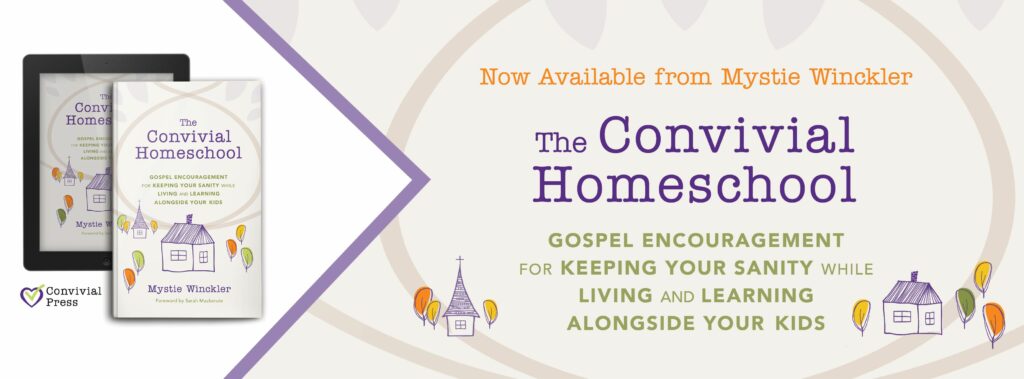
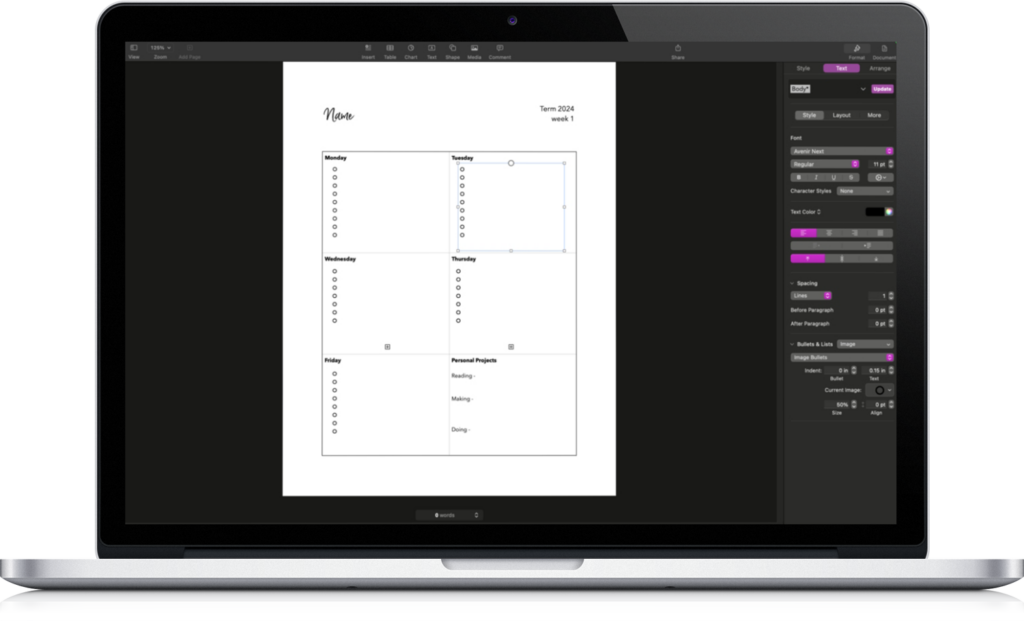
Get 5 of my favorite homeschool checklist templates!
Jumpstart your homeschool checklist practice by starting with one of my proven formats. Open, edit, and make them your own! Plus, get tips and followup, too –

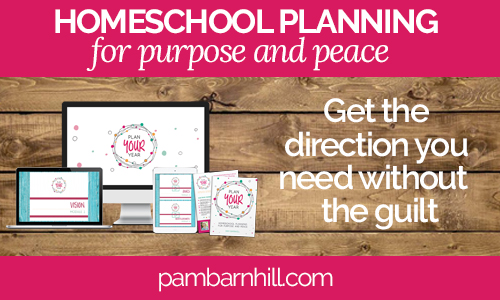
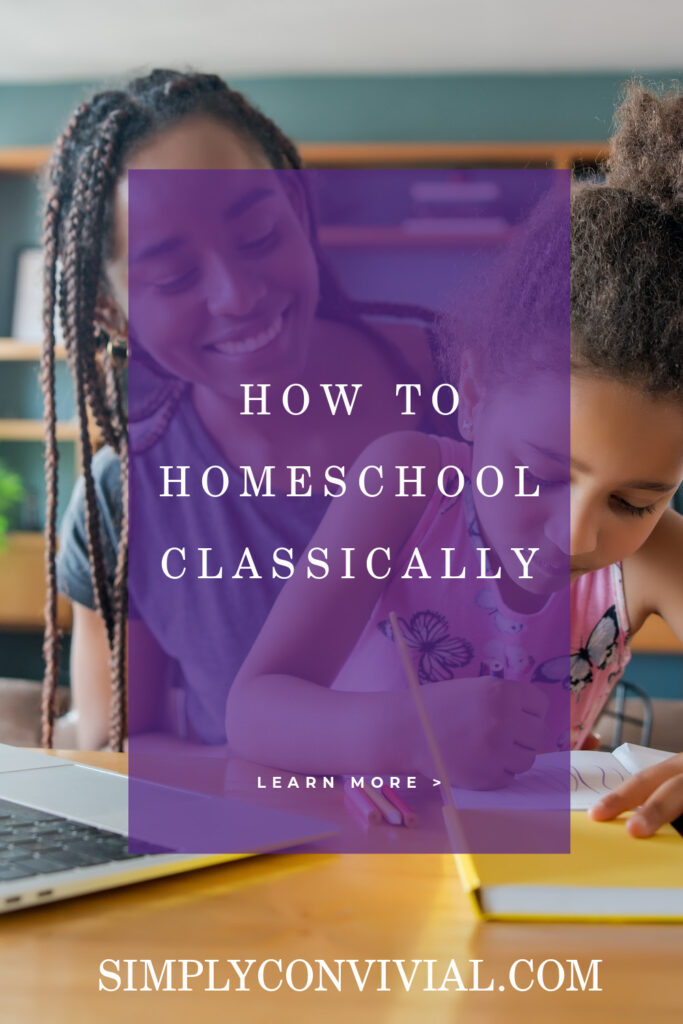



As always, I love to read what you’re thinking in the process of building truth and goodness into your children! Wondering if the yearly plans and reviews above are supposed to be links to click on? Thanks!
Each of those are actually tabs you can click and read. :)